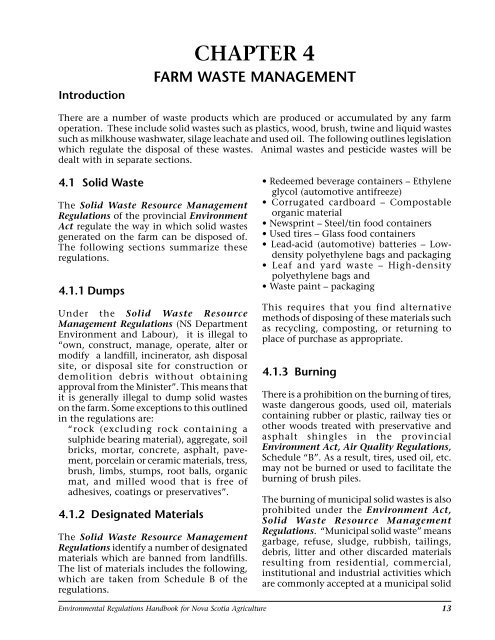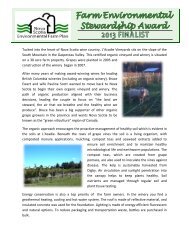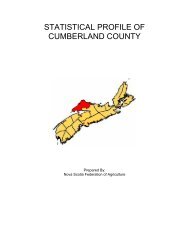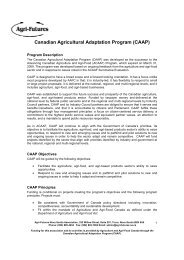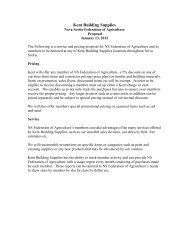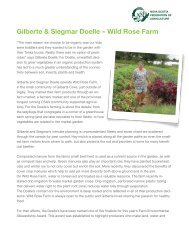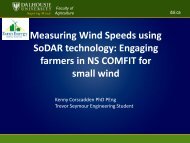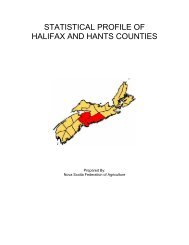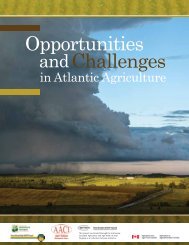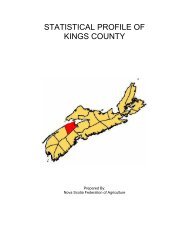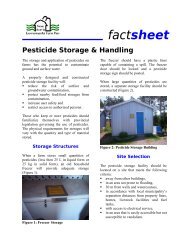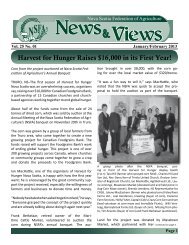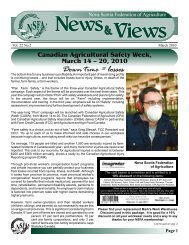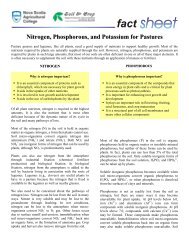Environmental Regulations Handbook for Nova Scotia Agriculture
Environmental Regulations Handbook for Nova Scotia Agriculture
Environmental Regulations Handbook for Nova Scotia Agriculture
You also want an ePaper? Increase the reach of your titles
YUMPU automatically turns print PDFs into web optimized ePapers that Google loves.
Introduction<br />
CHAPTER 4<br />
FARM WASTE MANAGEMENT<br />
There are a number of waste products which are produced or accumulated by any farm<br />
operation. These include solid wastes such as plastics, wood, brush, twine and liquid wastes<br />
such as milkhouse washwater, silage leachate and used oil. The following outlines legislation<br />
which regulate the disposal of these wastes. Animal wastes and pesticide wastes will be<br />
dealt with in separate sections.<br />
4.1 Solid Waste<br />
The Solid Waste Resource Management<br />
<strong>Regulations</strong> of the provincial Environment<br />
Act regulate the way in which solid wastes<br />
generated on the farm can be disposed of.<br />
The following sections summarize these<br />
regulations.<br />
4.1.1 Dumps<br />
Under the Solid Waste Resource<br />
Management <strong>Regulations</strong> (NS Department<br />
Environment and Labour), it is illegal to<br />
“own, construct, manage, operate, alter or<br />
modify a landfill, incinerator, ash disposal<br />
site, or disposal site <strong>for</strong> construction or<br />
demolition debris without obtaining<br />
approval from the Minister”. This means that<br />
it is generally illegal to dump solid wastes<br />
on the farm. Some exceptions to this outlined<br />
in the regulations are:<br />
“rock (excluding rock containing a<br />
sulphide bearing material), aggregate, soil<br />
bricks, mortar, concrete, asphalt, pavement,<br />
porcelain or ceramic materials, tress,<br />
brush, limbs, stumps, root balls, organic<br />
mat, and milled wood that is free of<br />
adhesives, coatings or preservatives”.<br />
4.1.2 Designated Materials<br />
The Solid Waste Resource Management<br />
<strong>Regulations</strong> identify a number of designated<br />
materials which are banned from landfills.<br />
The list of materials includes the following,<br />
which are taken from Schedule B of the<br />
regulations.<br />
• Redeemed beverage containers – Ethylene<br />
glycol (automotive antifreeze)<br />
• Corrugated cardboard – Compostable<br />
organic material<br />
• Newsprint – Steel/tin food containers<br />
• Used tires – Glass food containers<br />
• Lead-acid (automotive) batteries – Lowdensity<br />
polyethylene bags and packaging<br />
• Leaf and yard waste – High-density<br />
polyethylene bags and<br />
• Waste paint – packaging<br />
This requires that you find alternative<br />
methods of disposing of these materials such<br />
as recycling, composting, or returning to<br />
place of purchase as appropriate.<br />
4.1.3 Burning<br />
There is a prohibition on the burning of tires,<br />
waste dangerous goods, used oil, materials<br />
containing rubber or plastic, railway ties or<br />
other woods treated with preservative and<br />
asphalt shingles in the provincial<br />
Environment Act, Air Quality <strong>Regulations</strong>,<br />
Schedule “B”. As a result, tires, used oil, etc.<br />
may not be burned or used to facilitate the<br />
burning of brush piles.<br />
The burning of municipal solid wastes is also<br />
prohibited under the Environment Act,<br />
Solid Waste Resource Management<br />
<strong>Regulations</strong>. “Municipal solid waste” means<br />
garbage, refuse, sludge, rubbish, tailings,<br />
debris, litter and other discarded materials<br />
resulting from residential, commercial,<br />
institutional and industrial activities which<br />
are commonly accepted at a municipal solid<br />
<strong>Environmental</strong> <strong>Regulations</strong> <strong>Handbook</strong> <strong>for</strong> <strong>Nova</strong> <strong>Scotia</strong> <strong>Agriculture</strong><br />
13


